The Health bulletin [serial] - University of North Carolina at Chapel Hill
The Health bulletin [serial] - University of North Carolina at Chapel Hill
The Health bulletin [serial] - University of North Carolina at Chapel Hill
You also want an ePaper? Increase the reach of your titles
YUMPU automatically turns print PDFs into web optimized ePapers that Google loves.
equest for an expansion <strong>of</strong> such programs<br />
on the assumption th<strong>at</strong> full<br />
need would be met. Th<strong>at</strong> is one <strong>of</strong> the<br />
things we asked for and didn't get.<br />
Something we did not ask for and<br />
did get was the ceiling which the Committee<br />
placed on the AFDC program.<br />
<strong>The</strong> proportion <strong>of</strong> children on the<br />
rolls because <strong>of</strong> the absence or deser-<br />
tion <strong>of</strong> a parent would be frozen as <strong>of</strong><br />
the proportion obtaining in January <strong>of</strong><br />
this year. 1 will recommend to the<br />
Sen<strong>at</strong>e deletion <strong>of</strong> the provision.<br />
Under the House amendment, the<br />
Federal Government would be fore-<br />
closed from sharing in the support <strong>of</strong><br />
children whose condition is precisely<br />
the same as th<strong>at</strong> <strong>of</strong> children already be-<br />
ing assisted. <strong>The</strong> St<strong>at</strong>es would be en-<br />
couraged—virtually forced—to estab-<br />
lish even more restrictive eligibility re-<br />
quirements, or else to lower the al-<br />
ready inadequ<strong>at</strong>e support being paid.<br />
I do not believe th<strong>at</strong> children should<br />
have to pay for the shortcomings and<br />
inequities <strong>of</strong> the society into which they<br />
are born. I<br />
do<br />
not believe th<strong>at</strong> chil-<br />
dren should have to pay for the real<br />
or supposed sins <strong>of</strong> their parents. And<br />
I think<br />
it would be shortsighted <strong>of</strong> a<br />
society to produce, by its neglect, a<br />
group <strong>of</strong> future citizens very likely to<br />
be unproductive and characterized by<br />
bitterness and alien<strong>at</strong>ion.<br />
Earlier, I spoke<br />
<strong>of</strong> the new oppor-<br />
tunities we have to start to do the job<br />
th<strong>at</strong> we know needs to be done. But<br />
it would be dishonest not to acknowl-<br />
edge the real obstacles we face in try-<br />
ing to do it. Since we don't have all<br />
day, I<br />
won't<br />
name them all.<br />
<strong>The</strong> first and most obvious thing to<br />
say is th<strong>at</strong> many <strong>of</strong> the problems en-<br />
countered by the welfare program will<br />
not be solved within the context <strong>of</strong> the<br />
welfare program itself. <strong>The</strong>y are rooted<br />
in the fact <strong>of</strong> poverty and all th<strong>at</strong><br />
goes with it— bad housing, poor schools.<br />
dismal and decayed neighborhoods,<br />
crime, family life th<strong>at</strong> is <strong>of</strong>ten unstable,<br />
and the feelings <strong>of</strong> despair, ap<strong>at</strong>hy, and<br />
hopelessness harbored by so many who<br />
are trapped in such environments.<br />
I believe<br />
th<strong>at</strong> those in public wel-<br />
fare have been criticized, too <strong>of</strong>ten<br />
and unfairly, for failure to surmount<br />
problems th<strong>at</strong> are beyond their scope<br />
and power. Poverty itself is the enemy,<br />
and it will take a good deal more than<br />
changes in the welfare system to con-<br />
quer it.<br />
But we here today have to work<br />
within the immedi<strong>at</strong>e context, with<br />
the resources we now have available<br />
and within the restrictions placed upon<br />
us. We are able to reach only a frac-<br />
tion <strong>of</strong> the poor— about one-fourth—<br />
with financial help. We are able to<br />
reach a much smaller fraction <strong>of</strong> those<br />
who need social and rehabilit<strong>at</strong>ive serv-<br />
ices. <strong>The</strong> very least we can do is to<br />
deliver the available money and services<br />
effectively to those we are now<br />
able to help. We must be ardent advo-<br />
c<strong>at</strong>es for these immedi<strong>at</strong>e clients <strong>of</strong><br />
ours, but we must also strive to keep<br />
the eyes <strong>of</strong> the N<strong>at</strong>ion on the 24 mil-<br />
lion poor Americans who receive no<br />
financial help; on the 5 million chil-<br />
dren whose f<strong>at</strong>hers work full time all<br />
year round and still cannot make<br />
enough to support their families ade-<br />
qu<strong>at</strong>ely; on the millions more, poor or<br />
not, who need various kinds <strong>of</strong> help<br />
and service to cope responsibly and<br />
fully in a complex society.<br />
I said th<strong>at</strong> we have to act within<br />
the present context. Th<strong>at</strong> does not<br />
mean th<strong>at</strong> we cannot look beyond it.<br />
<strong>The</strong> extremely valuable report made to<br />
me by the Advisory Council on Pub-<br />
lic Welfare enlarges our vision <strong>of</strong> the<br />
job remaining to be done. One may or<br />
may not believe th<strong>at</strong> the route proposed<br />
by the Council is the best possible one<br />
to reach our goal. But it makes vividly<br />
10 THE HEALTH BULLETIN September, 1967


![The Health bulletin [serial] - University of North Carolina at Chapel Hill](https://img.yumpu.com/7806875/142/500x640/the-health-bulletin-serial-university-of-north-carolina-at-chapel-hill.jpg)
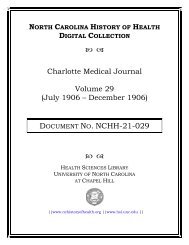
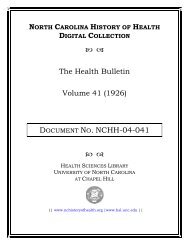
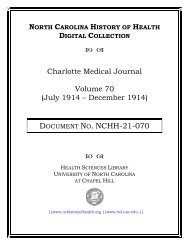
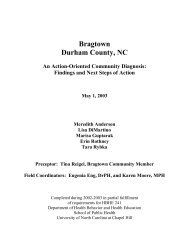
![Bulletin of the North Carolina Board of Health [serial] - University of ...](https://img.yumpu.com/48032016/1/153x260/bulletin-of-the-north-carolina-board-of-health-serial-university-of-.jpg?quality=85)
![The Health bulletin [serial] - University of North Carolina at Chapel Hill](https://img.yumpu.com/47603625/1/169x260/the-health-bulletin-serial-university-of-north-carolina-at-chapel-hill.jpg?quality=85)
![The Health bulletin [serial] - University of North Carolina at Chapel Hill](https://img.yumpu.com/47242858/1/169x260/the-health-bulletin-serial-university-of-north-carolina-at-chapel-hill.jpg?quality=85)
![The Health bulletin [serial] - University of North Carolina at Chapel Hill](https://img.yumpu.com/43204263/1/172x260/the-health-bulletin-serial-university-of-north-carolina-at-chapel-hill.jpg?quality=85)
![The Health bulletin [serial] - University of North Carolina at Chapel Hill](https://img.yumpu.com/41981074/1/163x260/the-health-bulletin-serial-university-of-north-carolina-at-chapel-hill.jpg?quality=85)
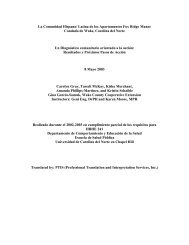
![The Health bulletin [serial] - University of North Carolina at Chapel Hill](https://img.yumpu.com/40912928/1/164x260/the-health-bulletin-serial-university-of-north-carolina-at-chapel-hill.jpg?quality=85)
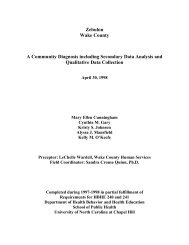
![The Health bulletin [serial] - University of North Carolina at Chapel Hill](https://img.yumpu.com/35643061/1/167x260/the-health-bulletin-serial-university-of-north-carolina-at-chapel-hill.jpg?quality=85)
![Biennial report of the North Carolina State Board of Health [serial]](https://img.yumpu.com/34024350/1/166x260/biennial-report-of-the-north-carolina-state-board-of-health-serial.jpg?quality=85)
